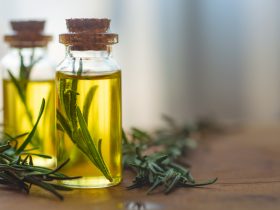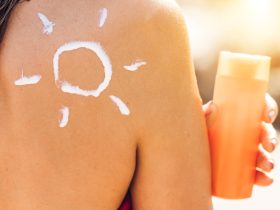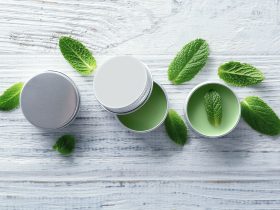Our skin serves as a mirror reflecting our overall health. Properly cared for, hydrated, and nourished with a nutrient-rich diet often radiates a glowing, beautiful complexion.
Conversely, the presence of whiteheads, blackheads, nodular acne, and other forms of pimples may signal oxidative damage, inadequate nutrition, and hormonal imbalances. Thus, it becomes crucial to explore home remedies for acne.
A holistic approach to skincare, including a balanced diet, the application of essential oils, gentle cleansing practices, and hormonal balance, can effectively address acne-related concerns. By adopting these home remedies, individuals can promote skin health, alleviate unsightly pimples and irritation, and minimize the risk of acne scarring.
- Tone Your Skin
Toning plays a vital role in maintaining proper skincare by removing any leftover residue after cleansing and restoring the skin’s natural pH balance. An effective toner for both morning and evening use is pure apple cider vinegar containing the mother culture.
Apple cider vinegar is enriched with potassium, magnesium, acetic acid, and various enzymes that possess antibacterial properties, making it beneficial for the skin.
Chronic acne can often result from the proliferation of bacteria and fungi on the skin’s surface. To combat this, apply apple cider vinegar onto the skin using a cotton ball, focusing on active breakouts and areas prone to acne. This helps to kill bacteria and fungi, promoting clearer and healthier skin.
- Use Natural, Healing Masks
To nourish and rejuvenate your skin, consider incorporating healing masks into your skincare routine a few times per week. These masks, made from ingredients like yogurt, honey, cinnamon, and essential oils, can provide soothing hydration while combating common acne triggers.
Here are two simple mask recipes that serve as effective home remedies for acne:
- Cinnamon and Honey Mask: Mix two tablespoons of raw honey, one teaspoon of coconut oil, and 1/2 teaspoon of cinnamon.
Smooth the mixture over your face, avoiding the eye area due to cinnamon’s potential irritant properties. Allow the mask to sit for five to 10 minutes before gently wiping it off with a damp cloth.
The combination of honey and cinnamon offers anti-inflammatory, antioxidant, and antibacterial benefits, making it effective for fighting acne. - Yogurt and Honey Mask: Combine one tablespoon of raw honey with one tablespoon of yogurt. Apply the mixture to your face, focusing on areas prone to acne such as the hairline and jawline. Leave the mask on for 10 minutes, then gently remove it with a damp cloth.
During active acne breakouts, consider adding a couple of drops of tea tree oil to either of the masks mentioned above. Tea tree oil is renowned for its antibacterial properties and is widely regarded as one of the best natural remedies for acne.
- Keep Your Skin Moisturized
It’s a common misconception that acne-prone skin should avoid moisturizing. However, using products that overly dry out the skin can actually stimulate increased oil production, leading to more clogged pores and acne breakouts.
For those with dry skin prone to acne, coconut oil can be an excellent moisturizer. It’s known for its versatility and health benefits, being rich in lauric acid, antioxidants, and medium-chain fatty acids that effectively hydrate and restore the skin.
Research has shown that lauric acid present in coconut oil exhibits potent antibacterial activity against acne-causing bacteria. This makes coconut oil a sought-after ingredient in beauty products, valued for its ability to moisturize and nourish both the skin and hair.
To create a simple homemade daily moisturizer, warm a small amount of coconut oil in the palms of your hands and gently massage it onto your clean face and neck. Allow it to absorb into the skin for about five minutes, then gently remove any excess oil with a dry cloth. Be mindful not to apply too much, as excess oil may lead to breakouts.
- Avoid Too Much Sun Exposure
For those with acne-prone skin, especially during breakouts, it’s crucial to shield against excessive sun exposure. UV rays can trigger pigment-producing cells, heightening the risk of acne scarring.
The preferred approach is to opt for natural sunscreens and limit direct sun exposure to a reasonable amount each day, typically around 15–20 minutes on most days.
Many commercial sunscreens contain harsh chemicals that can aggravate sensitive and acne-prone skin. Studies have shown that coconut oil and olive oil both have an SPF value of around 8, providing natural sun protection.
To utilize coconut oil as a sunblock, apply a moderate amount to the exposed skin every few hours. It’s also advisable to minimize prolonged sun exposure during peak hours, typically between 10 a.m. and 3 p.m., to reduce the risk of skin damage.
- Opt for Gentle Cleansing
Be mindful of how you cleanse your skin, as it’s essential for eliminating stubborn pimples, blackheads, and whiteheads. Consider trying a homemade honey face wash recipe, which includes ingredients like apple cider vinegar, honey, coconut oil, probiotics, and essential oils such as tea tree oil.
Honey offers soothing properties, coconut oil combats bacteria and fungus, while tea tree oil invigorates the skin.
To use, dampen your skin with warm water and massage the face wash onto your face and neck. Rinse thoroughly and pat dry. Incorporate this routine into your morning and evening regimen, and after workouts if necessary.
Avoid cleansing excessively, as it can irritate the skin and stimulate excessive oil production.
If you notice acne appearing around your hairline, your commercial hair products might be the culprit. Many shampoos, conditioners, hair sprays, gels, and mousses contain acne-causing ingredients like petroleum, parabens, silicones, sulfates, and panthenol.
Consider using a homemade honey citrus shampoo free of harmful chemicals, followed by a homemade conditioner made from apple cider vinegar and essential oils.
Additionally, be cautious of makeup and skincare products that may contain acne-triggering ingredients such as lanolin, mineral oil, aluminum, alcohol, and parabens. Check ingredient labels carefully to avoid applying these chemicals to your sensitive skin.
- Try Tea Tree Oil
Tea tree oil, also known as melaleuca, is renowned for its ability to combat acne and heal wounds. This natural antiseptic is widely used worldwide and offers antibacterial and antifungal properties, similar to coconut oil, honey, and cultured milk products.
Medical studies suggest that tea tree oil gels containing 5 percent tea tree oil can be as effective as products containing 5 percent benzoyl peroxide, a common acne medication. However, tea tree oil may work more gradually for some individuals, so patience is key.
To create a simple home remedy for acne using tea tree oil, mix four to eight drops of tea tree oil with one teaspoon of coconut oil or jojoba oil.
Gently apply this mixture to the affected areas. While a slight tingling sensation is normal, discontinue use if you experience significant burning. Always dilute tea tree oil with a carrier oil to avoid skin irritation.
Additionally, other ingredients like chamomile oil and aloe vera can help reduce inflammation, particularly if your skin is sensitive due to the use of products containing salicylic acid or benzoyl peroxide. Incorporating these soothing ingredients can provide relief and promote healthier skin.
- Gently Exfoliate Your Skin
Regular exfoliation is crucial for removing clogged pores and dead skin cells that contribute to acne. However, many commercial scrubs contain chemicals that can irritate the skin.
Fortunately, DIY scrubs made from natural ingredients can effectively combat acne while keeping the skin fresh, and they’re easy on the wallet too.
To create your own exfoliating scrub, you’ll need two components: something gritty to physically remove dead skin cells, and a base ingredient to provide moisture and combat bacteria and fungi on the skin. For the gritty component, options like sea salt, brown sugar, and ground oatmeal work well. As for the base, coconut oil, kefir, and honey are excellent choices.
To make the scrub, mix two tablespoons of your chosen dry ingredient with one to two tablespoons of the selected base. Gently rub the mixture into your skin using circular motions, starting from the forehead and working your way down, paying extra attention to areas prone to acne.
Once done, remove the scrub with a damp cloth and rinse your skin thoroughly. This DIY exfoliating scrub helps unclog pores, remove dead skin cells, and promote healthier-looking skin without the harsh chemicals found in commercial products.
- Use Essential Oils on Acne Scars
If you’ve dealt with acne in the past, you might be wondering how to address the lingering acne scars that can persist for months or even years.
Treating acne scars requires patience and persistence, and starting treatment as soon as possible can lead to better results. It’s common for individuals who have experienced acne to have some degree of scarring.
One of the most crucial steps in preventing scarring is to avoid picking or popping pimples, whiteheads, or blackheads during a breakout.
Additionally, it’s important to minimize sun exposure for six to 12 months following an acne breakout to prevent dark spots and scars from worsening. When spending time outdoors, use an all-natural sunscreen to protect your skin.
In the event that scars do develop, applying a drop of rosehip seed oil or carrot seed oil directly onto the scars twice daily can help improve their appearance over time. Other remedies such as coconut oil, lavender essential oil, honey, and gentle exfoliation may also aid in preventing scars, depending on your skin tone and texture.
To naturally address acne scars, you can create a homemade paste using raw honey, lavender essential oil, tea tree oil, and frankincense oil. Applying this paste to the affected areas can help promote healing and reduce the appearance of scars.
- Use Holy Basil to Fight Bacteria
Combatting acne-causing bacteria is essential for clear skin, and holy basil and sweet basil essential oils are effective allies in this battle. According to a report published in the International Journal of Cosmetic Sciences, both oils have been found to fight bacteria responsible for acne.
In the study, sweet basil oil demonstrated slightly superior performance in topical applications compared to holy basil oil. Additionally, holy basil oil, also known as tulsi oil, offers benefits for overall health by supporting healthy blood sugar and hormone levels.
Since hormonal imbalance and blood sugar fluctuations are linked with acne, consuming herbal tea made from holy basil daily can help naturally balance hormones and combat acne internally, making it an effective holistic remedy for acne.
Moreover, holy basil tea can also be applied topically to the skin as a toner, providing further acne-fighting benefits. Additionally, incorporating sweet basil or holy basil essential oils into homemade masks, cleansers, or exfoliating recipes can enhance their effectiveness in combating acne and promoting clearer, healthier skin.
- Have a Healthy Diet
Adopting a healthy, low-glycemic index diet is considered one of the most effective home remedies for acne prevention. This approach focuses on consuming foods that do not cause rapid spikes in blood sugar levels, thus helping to prevent acne breakouts. The glycemic index measures how quickly foods raise blood sugar, with processed and refined foods typically ranking high on the scale, while whole plant foods and lean proteins rank lower.
A study published in the American Journal of Clinical Nutrition in 2007 found that reducing glycemic load significantly affected acne severity.
Participants who followed a diet comprising 25 percent protein and 45 percent low-glycemic carbohydrates experienced nearly double the reduction in acne compared to those who consumed a higher-glycemic diet.
To maintain clear skin, it’s recommended to focus on consuming leafy green vegetables, berries, and lean protein sources such as wild fish, grass-fed meat, and cage-free poultry. Incorporating healthy fats rich in omega-3s, like those found in wild-caught salmon, is also beneficial for skin health.
Additionally, zinc-rich foods such as kefir, yogurt, lamb, pumpkin seeds, and chicken can help alleviate acne symptoms, as low zinc levels have been linked to acne severity.
Including high-fiber foods in your diet, such as vegetables, fruits, nuts, and seeds, supports colon cleansing and the growth of beneficial gut bacteria. Vitamin A-rich foods like spinach, carrots, and beef liver can also contribute to healthier skin.
Conversely, it’s important to avoid certain foods that can exacerbate acne, including hydrogenated oils, gluten, wheat, sugar, conventional cow’s milk dairy products, and high-carbohydrate foods.
Opting for alternatives like goat’s milk or raw milk can be beneficial, as conventional dairy products have been associated with acne.
Furthermore, limiting consumption of known allergens such as gluten, tree nuts, soy, peanuts, and shellfish can help reduce inflammation and prevent acne breakouts. Avoiding fried and fast foods, which contain inflammatory ingredients like hydrogenated oils, sodium, and chemicals, is also recommended.
Finally, minimizing intake of chocolate, particularly dark chocolate, can be beneficial, as it contains compounds that may trigger acne in some individuals.
- Support Your Gut Health
In the quest to combat acne, it’s important to address both external and internal factors. Probiotic supplements play a crucial role in this approach, as they support healthy digestion, boost immune system function, and contribute to improved skin health by combating acne.
Research published in Dermatology Online Journal suggests that probiotic foods and supplements hold promise as safe and effective home remedies for acne. While larger trials are still necessary to fully validate their efficacy, existing evidence indicates that probiotics can enhance gut health and serve as a valuable tool in the fight against acne.















Find Us on Socials